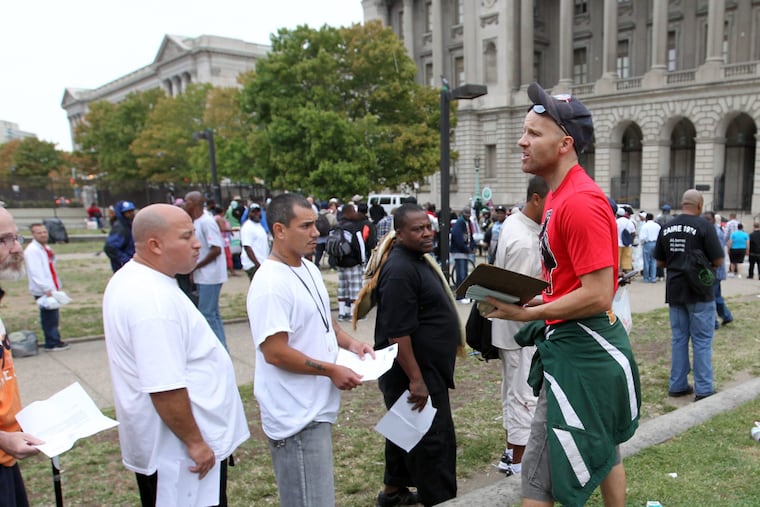Gov. Wolf, waive the fee for birth certificates so state IDs are easier to get | Ronnie Polaneczky
Without a state-issued ID, an already tough life gets much tougher for poor people whose safety nets tattered a long time ago.

You'll get zero done in Pennsylvania without a driver's license or some other form of state-issued ID.
Just try applying for a job, opening a bank account, or cashing a check. You can't. And good luck getting into an office building for an appointment or into a hospital to visit Grandma.
Basically, for those without licenses, life isn't doable without a state-issued ID, which costs $30.50. But obtaining the ID isn't doable unless you first present the state with a birth certificate to prove you exist.
Not everyone has ready access to a birth certificate (do you? I don't), especially the homeless and poor, who are often on the move.
And that's where an already tough life gets even tougher for people whose safety nets tattered long ago.
Replacing a Pennsylvania birth certificate costs $20. That's a fortune for folks living in deep poverty, as so many do. For the most destitute – those who've qualified for General Assistance – it equates to 10 percent of their monthly stipend of about $200 (which will be reinstated this fall, after being axed in the night six years ago by Gov. Tom "Scrooge" Corbett).
The cost of obtaining a birth certificate and ID is just unaffordable — but without it, people in poverty can't access the things that could change their fortunes, like employment, social services, and subsidized housing.
Pennsylvania has some of the highest fees in the country, by the way. It's obscene that Harrisburg is making major coin off the citizenry's vital statistics, which are so vital to our daily lives.
In 2017 alone, for example, the state issued 266,983 birth certificates where the $20 fee was collected. The fees generated $5,339,660, which was distributed to the Department of Human Services and the Pennsylvania Commission on Crime and Delinquency.
Worthy recipients, sure. But it sure would be humane to waive or reduce the fees for the poor.
There are both frustration and hope on that front.
First, the frustration: Lowering the $30.50 state-ID fee would require a change in state law, but no such bill is pending.
Now, the hope: There's actually a straightforward way to lower that $20 birth-certificate fee. And unlike most activities in Harrisburg, it doesn't require a change in law, a lobbyist's wallet, or a lot of gasbaggery.
It just requires Gov. Wolf's say-so.
Here's how it could happen:
In Pennsylvania, the Advisory Committee of the Department of Health comes up with the fees that we citizens pay for copies of our vital statistical records.
In 2014, for example, the committee authorized the Health Department to double the birth-certificate fee (yep, double) from $10 to $20.
The committee didn't require the department to do so; it just gave it the authority to do so. That means the department also has the authority to reduce or even eliminate the same fee.
In some cases, it already does.
For example, the fee is waived entirely for U.S. veterans and their dependents, regardless of their ability to pay. And in January, when Gov. Wolf declared a statewide heroin and opioid emergency, he waived the fee for addicts in order to speed up their ability to get the IDs they need to get into treatment.
So there's precedent.
"This would be a game-changer for poor people," says attorney Marsha Cohen, executive director of the Homeless Advocacy Project, who has been hammering on this issue for years now. Since 2016 alone, her staff attorneys have helped 1,853 poor people obtain birth certificates. "It should not be this hard for them."
Adam Bruckner sees the hardship firsthand. He's founder of Philly ReStart, an organization that has helped about 75,000 poor people obtain either birth certificates, state IDs, or both since ReStart's founding in 2002.
Each Monday, he and volunteers are out on the Parkway, meeting with the poor, who form two lines: one for food, and one for help obtaining IDs. The latter are referred by more than 100 social-services agencies who have pre-vetted them for assistance.
Bruckner raises $50,000 annually to pay the associated fees. If the state were to halve its birth-certificate fee, I ask him, what could he do with the leftover cash?
"Oh, wow," says Bruckner, youth director at Helping Hand Mission in Northern Liberties. "We could help families transition from public assistance to independent living, work on food insecurity and housing. You name it."
I contacted the governor's spokesperson, J.J. Abbott, to ask if his boss would work with the Health Department to craft a reasonable birth-certificate fee for the poor. (Bruckner thinks $5 is fair. "It's important that they pay something," he says.)
"In the context of REAL ID, this is something we have been analyzing but no final determination has been made," Abbott emailed. He was referring to the new ID that will eventually be required for commercial airline travel and access to federal buildings and military installations. "If I have any update, I will pass along to you ASAP."
The sooner the better, please. Because this seems like a manageable fix.
When Wolf waived the birth-certificate fee for people fighting addiction, he said it was "to protect Pennsylvanians from this looming public health crisis."
Well, Pennsylvania's deep poverty is a crisis all its own. And it's not looming.
It's already here.